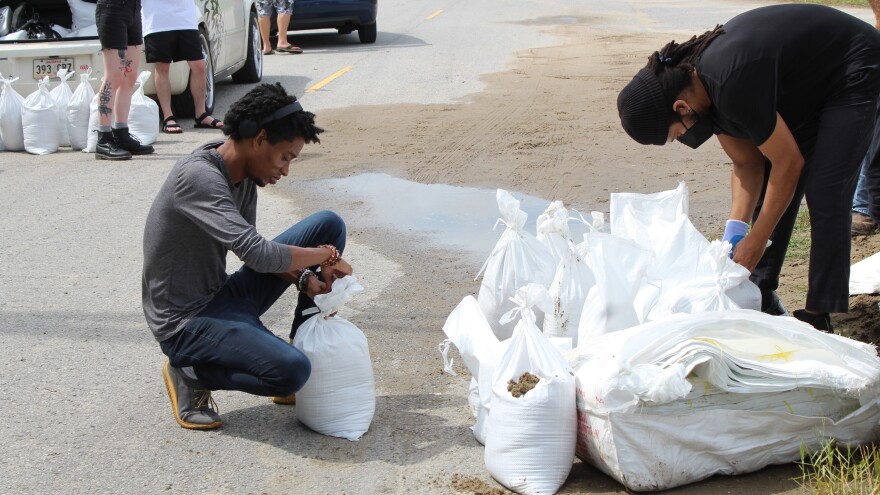On the west end of New Orleans, residents rushed to drive down a skinny residential road alongside the levee on Saturday afternoon. They came here to pick up bags of sand to build flood protection barricades around their homes ahead of Ida, which made landfall as a Category 4 hurricane Sunday. Louisiana Gov. John Bel Edwards earlier called it "one of the strongest storms to hit Louisiana since at least the 1850s."
For many residents, "sandbagging" is a normal ritual for any storm preparation. But the intensity of the storm and seeing neighbors and friends evacuate is triggering trauma from Hurricane Katrina. The Category 3 storm slammed into the Gulf Coast this same weekend 16 years ago, killing over 1,800 people and causing massive damage along the coast.
Algiers Point resident Dionne Allen evacuated during Katrina. But she decided to stay during Ida.

"I'm just here to get some sandbags for this storm that came from out of nowhere," Allen said. "And not to mention during the anniversary of Katrina, it's all pretty surreal."
Allen said she's just hoping it's not going to be as bad as Katrina.
"After calling hotels for two days I found all of them are basically booked. It's not as easy for some individuals financially to go ... if not mentally and also physically," she said.
Officials in the Gulf States had already been preparing for the worst before the storm hit.
Gov. Edwards activated the entirety of the Louisiana National Guard with 5,000 guardsmen available, and requested resources from FEMA. In neighboring Mississippi, Gov. Tate Reeves took similar steps.
In Alabama too, the Gov. Kay Ivey declared a state of emergency.
Some decided to heed the voluntary and mandatory evacuation notices in parts of Louisiana and Mississippi. And some weren't able to leave for financial or other reasons.
The decision-making process is triggering feelings of déjà vu for many, like Chris Dier, a teacher in New Orleans, who left during Katrina when he was a kid. His school was destroyed.
"I teach juniors and seniors. I definitely have those flashbacks when they went on the intercom and said that school was going to be closed on Monday and Tuesday. So I think it just stays with you. I think it's always going to stay for a long duration," he said.
For some, those feelings are worsened by the COVID-19 pandemic, such as for nurse Rachel Adcock who is staying put in Ocean Springs, Miss., right on the Gulf coast.
Adcock stayed through Katrina and remembers seeing graves that had been dislodged from the ground. The high death toll of the pandemic especially in the South is worsening the anxiety around the potential impacts of the storm.
"COVID-19 has hit Ocean Springs very hard. We even have friends that are in ICU right now. So their family members are dealing with their family being in ICU and the hurricane. So I feel very deeply for them right now," she said.
Dr. Denese Shervington, a clinical professor of psychiatry at Tulane University School of Medicine, has been studying the psychological impacts of Katrina and says it's critical to consider the mental health of people evacuating and staying to ride out the storm.
"We have to remember, not only are we having a natural disaster, one that's potentially going to happen on the 16th anniversary of a past disaster, which for some people is not fully resolved, we know we're in the midst of another disaster, which is a pandemic," said Shervington.
She said housing is the number one priority and that unhoused individuals, low-income communities of color, children and people without resources to evacuate will feel the after effects of the storm for a while.
"The most important thing is housing and stabilization and getting people back to be able to function, and immediately after that, we need to start paying attention to how our people are feeling."
Copyright 2021 WWNO - New Orleans Public Radio

